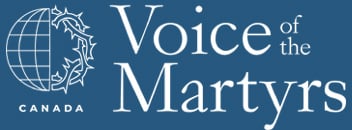Tags
China
-
Demolition & Detention on Easter Sunday
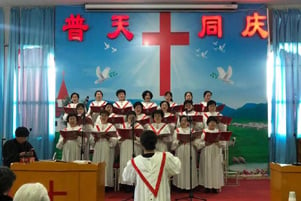
Donghu Church
Photo: ChinaAidThe Donghu Church in Xining has stood firm in the face of opposition for years. Even though it was officially approved by the Chinese authorities in 2003, this church of more than 300 members has faced problems for years.
In December 2017, the fire department closed the building, citing an unspecified "hidden danger." Following this, the congregation purchased a new building but it was not approved. So the members began meeting in the Donghu Hotel instead. This was also opposed and, in December 2019, the fire department sealed the door. This did not stop the members, who climbed through a window of the church building to resume meeting together. On Christmas Day, however, the electrical power was cut off in the middle of the service and authorities told them the building would be demolished. For more details, see this report.
-
Online Preaching Banned

Photo: Facebook / Pray for
Early Rain Covenant Church (derivative)Authorities in Shandong province have issued an order banning online preaching. In a notice sent to the official churches of the province, the order stated that "all livestreamed preaching should be stopped immediately." With the outbreak of COVID-19 in China, the prevalence of Internet-based services has increased significantly. Non-registered churches have also begun using online services after being shut down by authorities.
-
Religious Funerals Banned
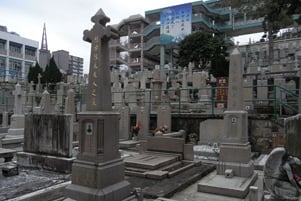
A Christian cemetery in Hong Kong.
Wikimedia / Cupentradoo (CC BY-SA)Christian funerals are being forbidden in some areas of China, as authorities begin enforcing new regulations to ensure the conducting of so-called "civilized" ceremonies. In the state of Zhejiang, funerals are only allowed to take place in government-approved church buildings. While clergy may be permitted to visit families of the deceased in homes, they are forbidden from conducting any religious ceremonies or services of prayer. If mourners do gather in a home, there can be no more than ten family members reading Scripture or quietly singing hymns.
-
New Religious Regulations
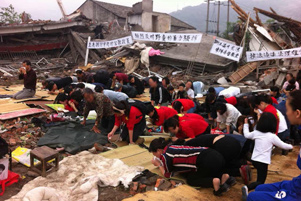
Believers kneel in the rubble of
their former place of worship.
Photo: ChinaAidAs of February 1st, a new series of regulations on religion were released by the Chinese government. Consisting of six chapters and 41 articles, the restrictions require all religious leaders and organizations to demonstrate complete devotion to the Chinese Communist Party. For years, the Chinese government has controlled and monitored religious organizations. Under President Xi Jinping, this has become much more overt. The Party has been set as the official head of all religious organizations. Religious symbols are being removed, replaced by flags and pictures of President Xi.
-
Government-Recognized Church Faces Demolition
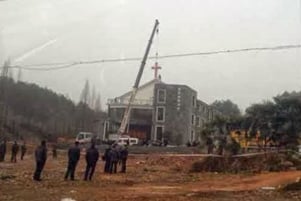
Chinese authorities have been targeting places of worship, including the Three-Self Churches.
Photo: ChinaAidThe Donghu Church in Xining received official approval from authorities in 2003, and has been operating as a government-approved Three-Self Church by meeting the legal requirements. With more than 300 members, it is the oldest and largest church in the district. Yet, despite its official status, the church has still faced opposition from authorities.
-
Women Imprisoned for Collecting Offerings
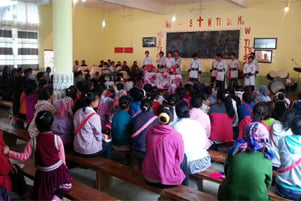
Please continue to stand with our
brothers and sisters in China
Photo: ChinaAidThe pastor of a house church in China's Hubei province, along with two other women from the church, are facing charges of fraud because they collected offering money for their church. Officials claim that the church is illegal and its pastor does not have a legal ordination; therefore, they allege the money was collected fraudulently. The pastor, Hao Zhiwei, could face more than 10 years in prison if convicted.
-
Pastor Wang Yi Sentenced to Nine Years
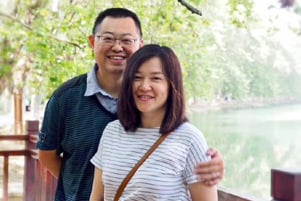
Pastor Wang Yi and his wife, Jiang Rong
Photo: ChinaAidIn what is believed to be the longest sentence against a house church leader in more than a decade, Pastor Wang Yi of the Early Rain Covenant Church was sentenced to nine years in prison for "inciting to subvert state power" and "illegal business operations." The charges for business operations relate to the printing and distribution of Christian books by the church.
-
Four-Year Sentence for Church Elder
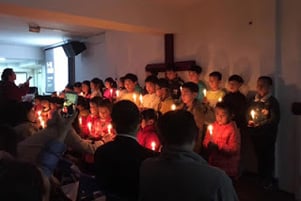
Attendees of Early Rain Church.
Photo: ChinaAidOn the evening of December 9th, 2018, a coordinated attack against the Early Rain Covenant Church began, ultimately leading to dozens of arrests and the closing of the church (see this report). Over a year later, Pastor Wang Yi and others remain uncertain of the future, as they now contend with the outcome of court proceedings.
-
Church Closure in Shanghai
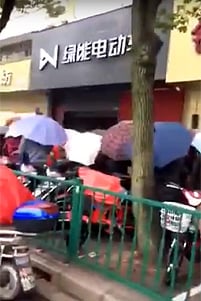
Members of the Wheat Church
sang praises outdoors.
Photo: VOM KoreaGovernment agents raided the Wheat Church in Shanghai during their Sunday worship service on December 1st. They accused those present of conducting religious activities in an illegal place and banned any future activities. In response to the government ban, church members gathered on the street outside their building the following week. While asking not to be identified, they have released a short video of them in worship (watch now).
According to Eric Foley, CEO of VOM Korea, Christians in China are responding to the increased persecution by seeking alternative ways to gather for worship. Rather than adhering to the modern "megachurch" model, they are returning to former ways of worshipping God -- a time when believers would meet wherever they could -- in homes, parks, even while walking. Eric Foley points to the need for resources to equip the leadership of these smaller group gatherings. For more information on the persecution facing Christians in China, and to review previously posted reports, go to our country report.
-
Hostility Towards Foreign Missionaries

John Cao
Photo: Ben Cao via ChinaAidAfter President Xi Jinping was granted a tenure of life in power, he suddenly increased his efforts to suppress religion. Missionaries serving within the country are frequently perceived as foreign spies. Todd Nettleton from VOM USA reports that a number of foreign workers in China have found their visas rejected at the time of renewal.
Two leaders of an American organization that supplies workers to teach English in China were arrested in September, based on claims that they had illegally moved people across borders. These accusations are similar to those facing Pastor John Cao, an American missionary who was sentenced to seven years in prison for allegedly smuggling people across the China/Myanmar border. For more information on Pastor Cao, read this report. To write him an encouraging letter, visit his profile on PrisonerAlert.com.
